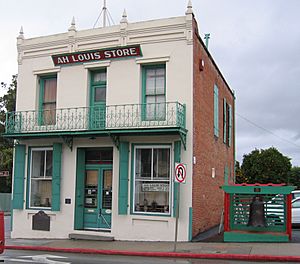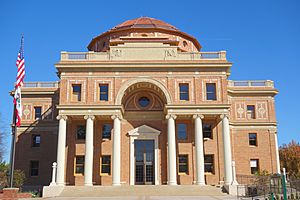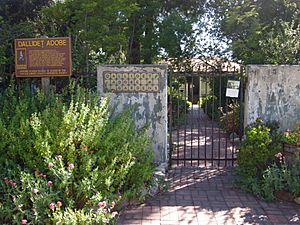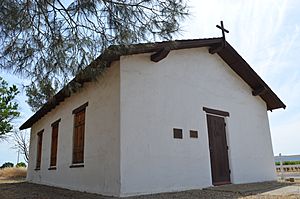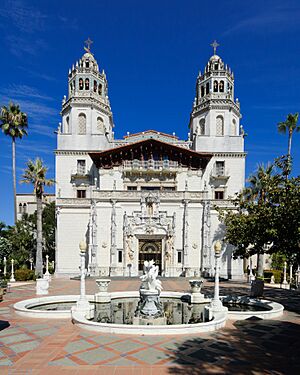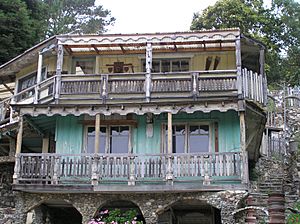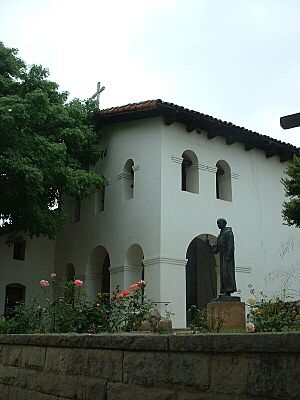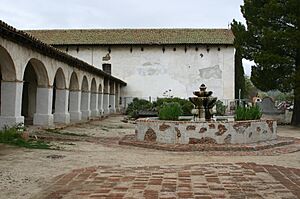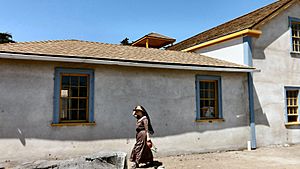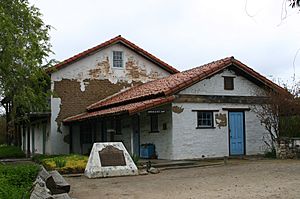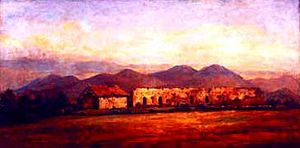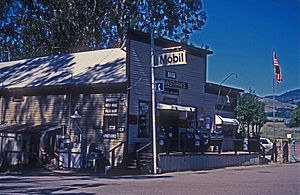California Historical Landmarks in San Luis Obispo County facts for kids
This article is about some really cool and important places in San Luis Obispo County, California. These spots are called California Historical Landmarks because they played a big part in California's history. Think of them as special treasures that help us remember the past!
Contents
- Exploring San Luis Obispo County's History
- Ah Louis Store
- Atascadero Administration Building
- Dallidet Adobe
- Estrella Adobe Church
- Hearst San Simeon State Historical Monument
- Nitt Witt Ridge
- Mission San Luis Obispo de Tolosa
- Mission San Miguel Arcángel
- Morro Rock
- Rancho Nipomo
- Rios-Caledonia Adobe
- Santa Margarita de Cortona Asistencia
- Sebastian Store
Exploring San Luis Obispo County's History
San Luis Obispo County is full of amazing historical sites. From old missions to unique buildings, these landmarks tell stories about the people and events that shaped this area. Let's take a look at some of these fascinating places!
Ah Louis Store
The Ah Louis Store, located at 800 Palm Street in San Luis Obispo, is a very special place. It was built in 1885 by a Chinese immigrant named Ah Louis. He was a really important person in the community.
Ah Louis helped many Chinese laborers find work building railroads and tunnels. His store was a general store, but it was also a meeting place. It served as a bank, a post office, and a community center for Chinese immigrants. It's a great example of how different cultures helped build California.
Atascadero Administration Building
In Atascadero, you'll find the Atascadero Administration Building at 6500 Palma Avenue. This impressive building was finished in 1918. It was designed by a famous architect named Myron Hunt.
This building is the heart of Atascadero. It was part of a big plan to create a perfect, self-sufficient community. The building's unique architecture makes it stand out. It shows the dreams and ideas of the people who founded the city.
Dallidet Adobe
The Dallidet Adobe, found at 1309 Toro Street in San Luis Obispo, is one of the oldest homes in the city. It was built around 1853 by Pierre Hypolite Dallidet. He was a French immigrant and one of the first winemakers in the county.
This adobe house gives us a peek into what life was like in early California. It shows how people lived and built their homes before modern materials were common. The gardens around it are also very beautiful and historic.
Estrella Adobe Church
Out near Paso Robles, on Airport Road, stands the Estrella Adobe Church. This small, simple church was built in 1879. It was a place of worship for the early settlers and pioneers in the Estrella Valley.
The church is made of adobe, which is a building material made from earth and straw. It reminds us of the hardy spirit of the people who settled this area. It's a quiet spot that tells a big story about community and faith.
Hearst San Simeon State Historical Monument
One of the most famous landmarks in California is the Hearst San Simeon State Historical Monument, often called Hearst Castle. It's located near San Simeon. This incredible estate was built by William Randolph Hearst, a very wealthy newspaper publisher.
Construction on the castle began in 1919 and continued for many years. It has huge, fancy buildings, beautiful gardens, and amazing art from all over the world. Visiting Hearst Castle is like stepping into a grand, historical fairy tale.
Nitt Witt Ridge
In Cambria, at 881 Hillcrest Drive, you'll find a truly unique place called Nitt Witt Ridge. This is not a typical historical building. It's a folk art environment created by a man named Arthur Harold Beal, also known as Captain Nitt Witt.
He spent decades building his home from recycled materials. He used everything from abalone shells to car parts! It's a fascinating example of creative expression and recycling. It shows how one person's vision can turn everyday objects into a work of art.
Mission San Luis Obispo de Tolosa
The Mission San Luis Obispo de Tolosa is right in the heart of San Luis Obispo, between Chorro and Broad Streets. It was founded in 1772 by Father Junípero Serra. This makes it the fifth of the 21 California missions.
The mission played a key role in the early history of California. It was a center for farming, education, and religious life. Today, it's still an active church and a beautiful place to visit. You can learn about its history and see its lovely gardens.
Mission San Miguel Arcángel
Further north, in San Miguel, you'll find Mission San Miguel Arcángel at 775 Mission Street. This mission was founded in 1797. It was the 16th mission established in California.
The mission is known for its original frescoes and murals inside the church. These paintings were done by Native American artists. They are a wonderful example of early California art and history. The mission continues to be a vibrant part of the community.
Morro Rock
Off the coast of Morro Bay stands the impressive Morro Rock. This giant volcanic plug rises 576 feet (175 meters) from the ocean. It's a very famous landmark and a symbol of the Central Coast.
Morro Rock is part of a chain of nine volcanic peaks called the "Nine Sisters." It's an important nesting site for birds, especially peregrine falcons. It's a beautiful natural landmark that has been important to both Native Americans and early explorers.
Rancho Nipomo
In Nipomo, at 6715 Oakglen Avenue, you can visit Rancho Nipomo. This historic rancho was granted to Captain William G. Dana in 1837. He was one of the first American settlers in the area.
The Dana Adobe, which is part of the rancho, is one of the oldest homes in San Luis Obispo County. It shows what life was like on a large Mexican land grant. It's a great place to learn about the rancho era of California history.
Rios-Caledonia Adobe
Also in San Miguel, at 700 Mission Street, is the Rios-Caledonia Adobe. This adobe was built in 1835. It served many purposes over the years, including a home, a stagecoach stop, and a hotel.
Its long history makes it a fascinating place to explore. It saw many travelers and changes during California's early days. It's a great example of how buildings adapted to the needs of the growing state.
Santa Margarita de Cortona Asistencia
Near Santa Margarita, on the Rancho Santa Margarita Hay Barn property, are the remains of the Santa Margarita de Cortona Asistencia. An "asistencia" was like a branch or outpost of a main mission. This one was connected to Mission San Luis Obispo de Tolosa.
It was built in 1787 to help with farming and ranching far from the main mission. While it's on private property, its history is important. It shows how the missions expanded their influence and activities across the land.
Sebastian Store
The Sebastian Store is located on San Simeon Road in San Simeon. This old general store was built in 1852. It was a vital part of the small coastal community.
For many years, it served as a post office, a general store, and a place where fishermen and ranchers could get supplies. It's a charming reminder of the early days of coastal California, when small towns relied on places like this for everything.


